🗡️ Who murdered the Murujuga rock art science?
Special Cluedo™️ edition 🔍 Was it Mr Cook or Prof Smith?
Roger Cook granting Alcoa greater access to mine near Perth's dams risks could cost taxpayers billions of dollars and result in water restrictions

EXCLUSIVE INVESTIGATION
The WA government has endangered the water supply to Perth and the South West while pretending to do otherwise.
Roger Cooks’ government has allowed US miner Alcoa into high-risk areas, lowered protection standards and ordered its environmental regulator to put mining jobs before water quality.
The public was unaware bauxite mining threatened its water supply until a confidential government briefing reported two years ago revealed that if dams were contaminated from Alcoa’s mining, it could take up to five years and $2.6 billion to fix.
In response, then WA Premier Mark McGowan was adamant, “We’re not going to jeopardise the state’s water supply.”
In recent years, Alcoa’s strip mining of the jarrah forest has moved closer to Serpentine Dam, Perth’s largest.
Sediment flowing into the dam from cleared areas after heavy rainfall could render its water treatment plant useless, shutting down the vital facility.
Toxic PFAS and oil spilt by Alcoa are added problems.
McGowan laid down the law to the US miner: "They need to satisfy our regulatory agencies, which are very, very cautious that the measures they put in place will prevent any runoff of that nature into our water supply.”
However, WA Labor’s deeds have been the opposite of its words.
The board of the state-owned Water Corporation was briefed on the bad news in December 2023.
Premier Roger Cook – who, as state development minister, has had principal responsibility for Alcoa since early 2021 - was about to jeopardise the utility’s ability to provide a safe and reliable water supply.
For some years, Alcoa was not allowed to clear the jarrah forest where contamination of the water supply was most likely. Steep slopes, clearing more than 30 per cent of a valley, and areas where groundwater was near the surface - called constrained areas - were all off-limits.
These restrictions were costing Alcoa money. The miner had to extract lower-grade ore from other areas, driving up the cost to produce alumina from its refineries in Pinjarra and Kwinana.
The US miner was pushing for its 2023-2027 mining plan that included the constrained areas to be approved.
Water Corporation advised contamination of the water supply would be a certainty.
In October 2023, the Department of Water and Environmental Regulation (DWER) rejected the plan “in its entirety.”
The Cook government ignored the experts.
Alcoa would be given almost unlimited access to the forest south of Serpentine Dam, except for within one kilometre of the water’s edge.

The utility was left with little ability to protect key assets, so management suggested work be done to build spare capacity before a dam was contaminated.
Replacing Serpentine Dam with additional desalination capacity would cost $1 billion.
Contamination of the smaller Serpentine Pipehead Dam below the main dam would cause chaos as it connects to many parts of the water system. Laying pipelines to bypass it would cost $200 million.
In May 2024 Water Corporation chief executive Pat Donavan gave his board more detail about the ramifications of a contaminated Serpentine Pipehead Dam.
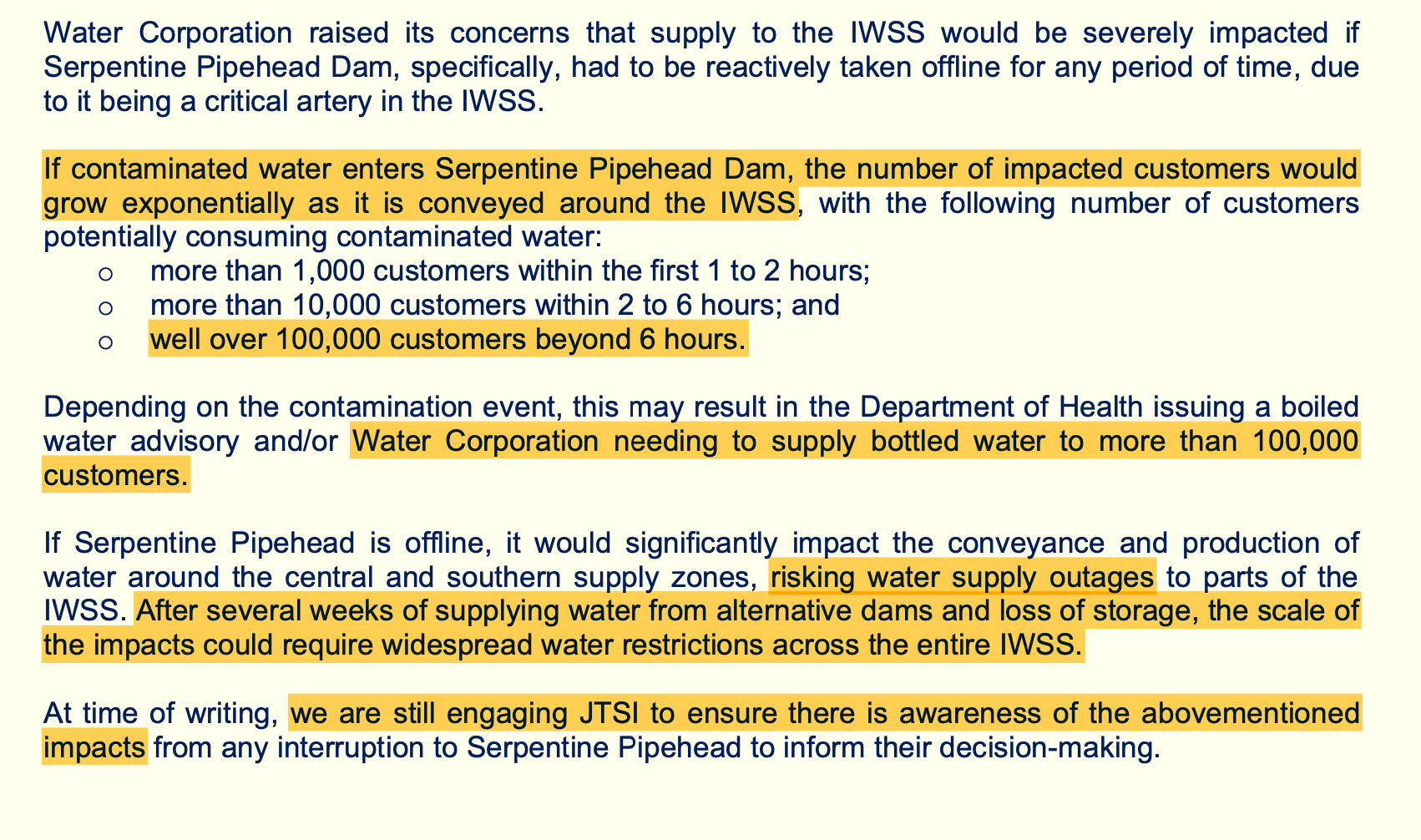
The contamination could push the quality and reliability of the main water supply system in Australia’s richest state to third-world standards.
The utility was concerned water shortages could stem the long-term growth of the entire Perth and Peel regions.
Despite all of this, Water Corporation was unsure if Roger Cook’s Department of Jobs, Tourism, Science and Innovation understood the ramifications of what it was doing.
In December 2023, Cook launched a “new framework to strengthen Alcoa’s environmental approvals".
The Premier said it strengthened the protection of the environment.
Environment minister Reece Whitby said, "We've made it clear to Alcoa that protecting Perth's drinking water remains paramount,” adding that the government had limited where Alcoa could mine.
That wasn’t true.
While some areas mined to date – especially within 1000m of a reservoir – would now be untouched, a vastly greater area was opened up for strip mining.
Most importantly, slopes greater than 16 per cent had been off-limits. Now, that restriction only applied within 2000m of a reservoir.
Clearly, the government had the same view as Water Corporation: “This relaxation is likely to be highly contentious to the community.”
The government solved the problem by misleading the community. It used langauge to portray the relaxation of restrictions on Alcoa’s mining as a tightening.
An Alcoa spokesman said it continued to comply with the strict conditions put in place by the State Government. The company had also deferred plans to mine in the Reservoir Protection Zone in its mining expansion proposalwith the Environmental Protection Authority.
“The community can continue to have confidence in Alcoa’s muti-decade track record of operating in WA without ever negatively impacting drinking water supply,” he said
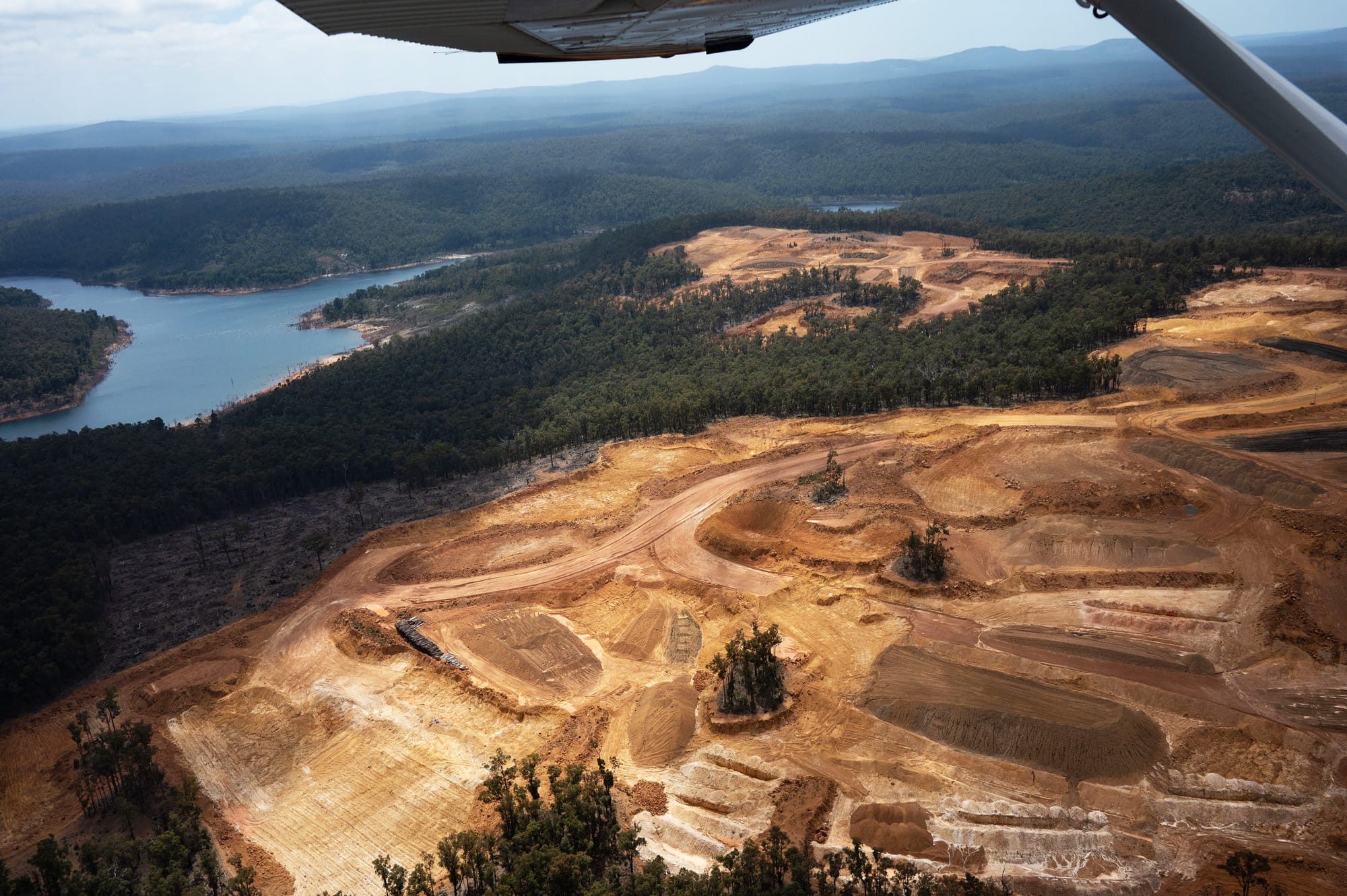
A deep understanding from two years of coverage
Months unearthing new documents
Building trust with sources
Checking the facts
All needed for this one story
Free to read but not free to produce
The Water Corporation used the Australian Drinking Water Guidelines (ADWG) to determine that Alcoa’s planned mining was an unacceptable risk to Perth’s water supply.
The DWER website describes it as a preventative approach that aims to prevent risks in the first place rather than reduce or mitigate them, in a note on how to protect public drinking water source areas (PDWSA).
In fire terms, it’s better to stop an arsonist than build a fire break.
The note lauds WA’s approach.
“Our drinking water source protection program here in WA is world’s best practice.
“We use the preventive risk-based approach because prevention is a key feature of best practice drinking water quality management.
“Other risk-based approaches can be appropriate outside PDWSAs, but they are not best practice within PDWSAs."
The note is wrong.
The ADWG is no longer applied where Alcoa wants to mine.
Protection of WA’s water supply is no longer “world’s best practice.”
The move away from world best practice was an unspoken part of Cook’s new approach to managing Alcoa – the Alcoa Transitional Approvals Framework (ATAF) – that he announced in December 2023.
Two months later, a Department of Health committee on the protection of drinking water sources noted, “The ATAF shifted the risk approach for Alcoa from a preventative to a a reasonable practicable approach which is not consistent with … Australian Drinking Water Guidelines.”
Donavan told his board the Water Corporation would no longer participate in government decision-making regarding Alcoa as it carried “the reputational risk of being party to approving mining activity which ultimately impacts its operations.”
There was no seat at the table if you were not willing to drop your standards.
Cook cemented his government’s position that Alcoa’s access to the jarrah forest was more important than protecting the water supply on August 10, 2024, when he signed off on WA’s new approach to regulating bauxite mining.
The ATAF was “designed to mitigate social and economic impact of curtailment of Alcoa’s mining and afford a reasonable level of risk mitigation (to the water supply).”
A new group – the Bauxite Strategic Executive Committee (BSEC) – would advise Cook on all issues involving Alcoa and WA’s other bauxite miner, South32’s Worsley.
Its responsibilities include:
“Consider risks to public drinking water resulting from the mining operations and help Government ensure there is a clear path of where mining is preferred into the future for both Alcoa and Worsley.”
Not content with lowering the level of protection for the water supply, Cook has also told his advisers not to give him advice that is bad for the miners.
It is an awkward position for staff from the Department of Water and Environmental Regulation who sit on BSEC to be told water and the environment are not a priority.
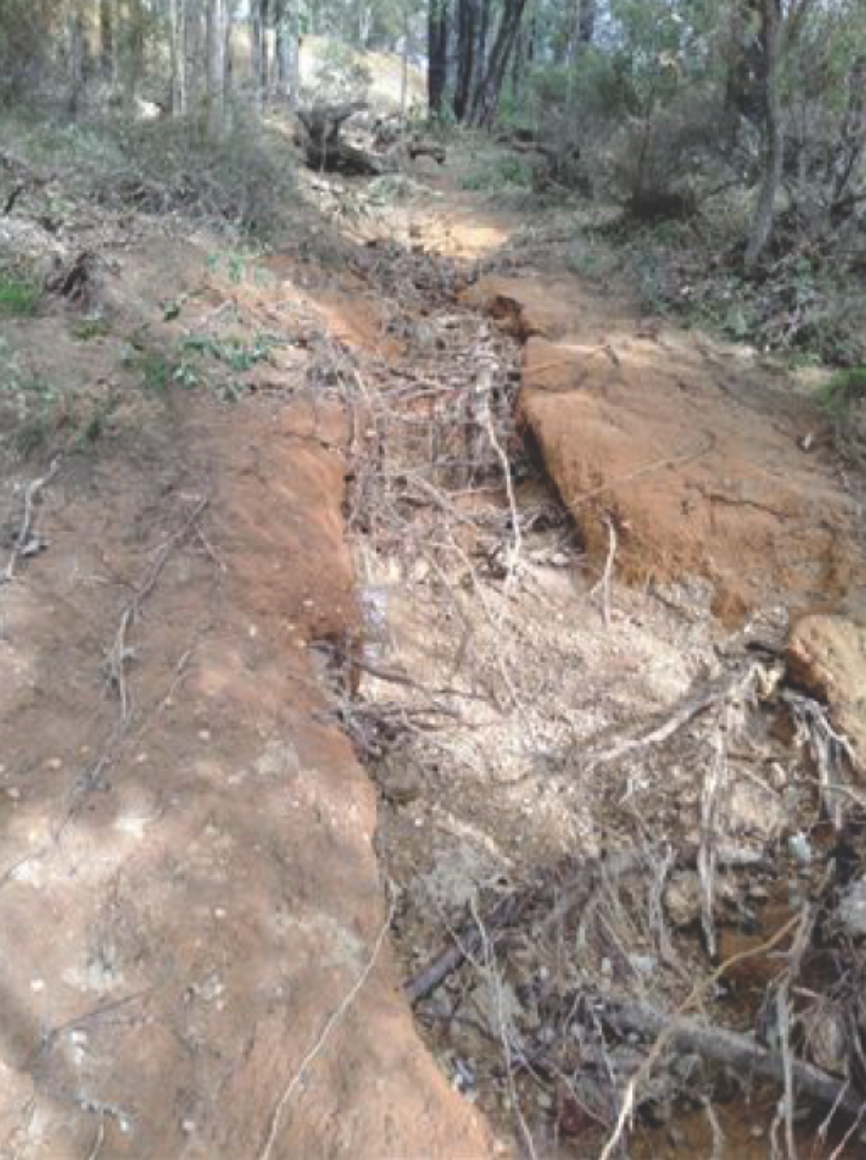
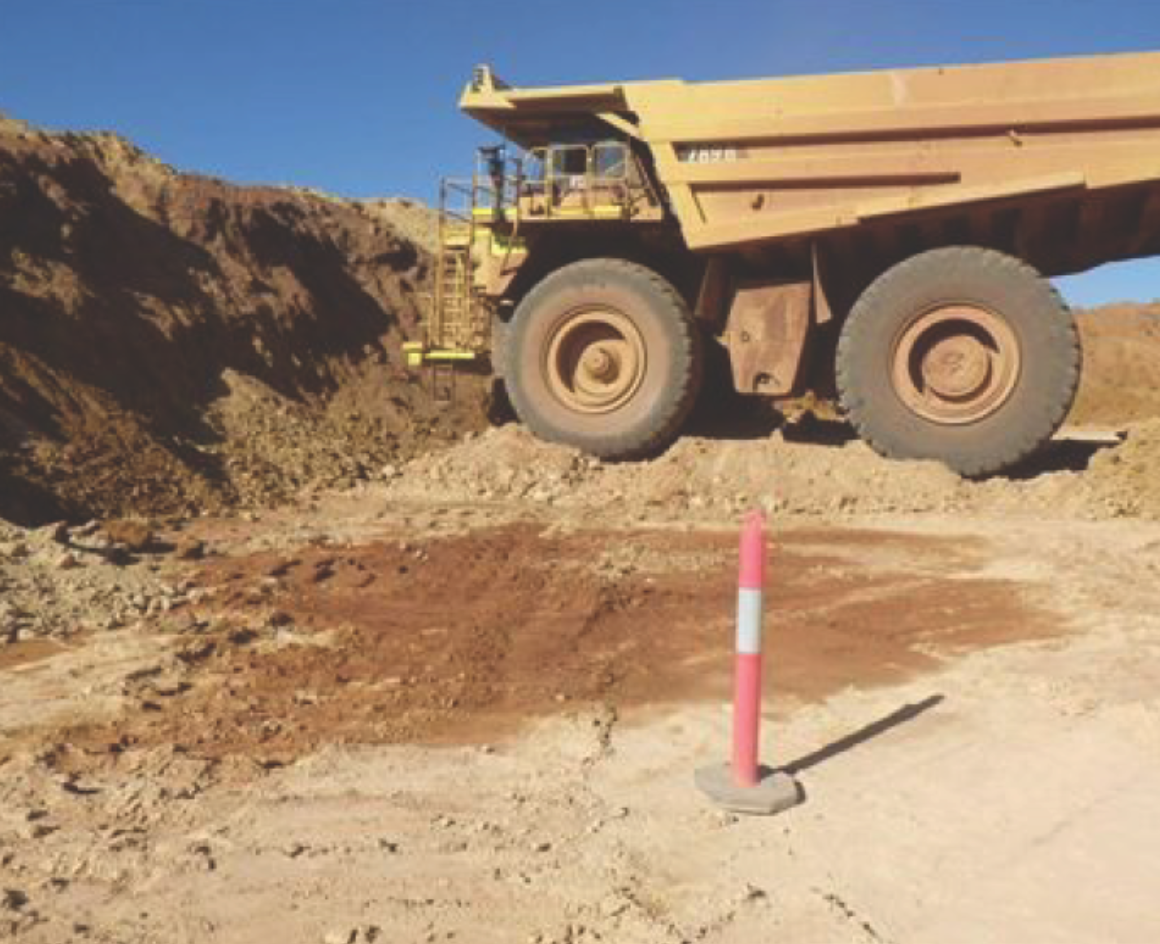
Drainage failure that could allow a dam to be contaminated and a 3000-litre spill of diesel in the water catchment. (Presentation to Water Corporation board March 2023)
Cook has to balance the future of Alcoa’s 4100 direct employees in WA (about 0.25 per cent of the state’s workforce) and indirect jobs against the risk to the water supply for most of WA’s population.
For now, he has gone with Alcoa, but without telling the community the cost may be their water supply.
Alcoa has much more at stake.
In 2024, it sourced 72 per cent of its bauxite - the ore that produces aluminium - from WA.
The 3000 tonnes of bauxite it strips from the jarrah forest every hour is the foundation of the $14 billion company’s business.
It is understood from numerous sources that Alcoa has frequently threatened shutdowns and significant job losses in negotiations with the WA government.
Its share price plunged seven per cent in a day, wiping $650 million off its value, in mid-2023 when it said some WA environmental approvals were running late.
The market reaction to a shutdown would be much greater, making it a very dangerous negotiation ploy.
Jason Fowler, senior campaigner at the WA Forest Alliance, said the WA government had been weak and unprincipled.
“Its promise to prioritise Perth's drinking water was an empty one,”
“Instead, bauxite miners are being given pretty much carte blanche in where they clear our irreplaceable Northern Jarrah Forest.”
The economic benefits for WA from Alcoa have resulted in an environmental imprint that goes beyond threatening the water supply.
After six decades of mining it has not fully rehabilitated a single hectare of the 28,000 hectares of jarrah forest it has felled.
Near its refineries, most of its 368 million cubic metres of towering toxic red mud processing waste – enough to fill Perth’s Optus stadium 350 times – has failed stability checks.
Now, there is the cost of preparing the water system for contamination from its mining.
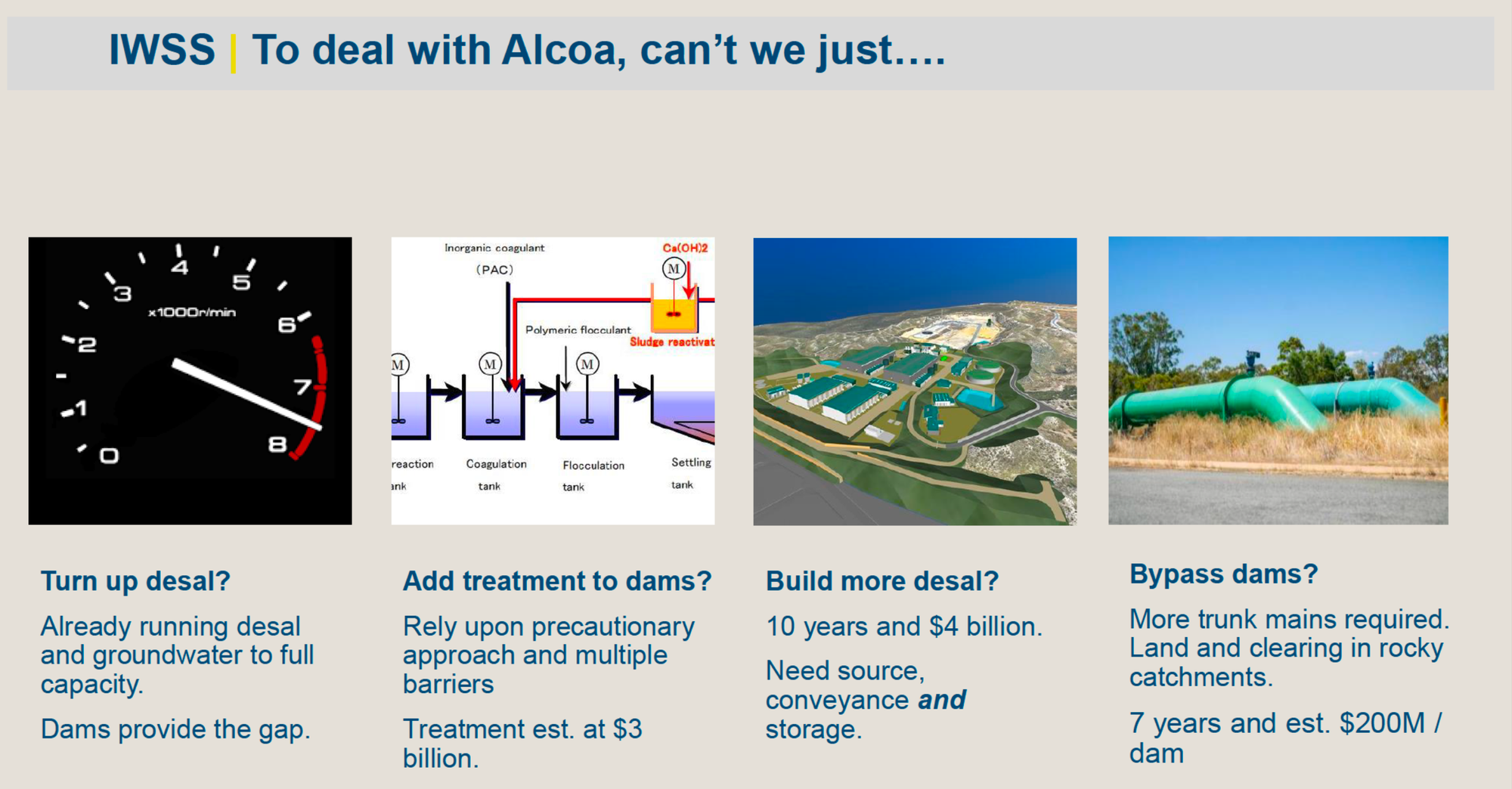
Water Corporation was asked:
Water Minister Simone McGurk was asked:
The Department of Water and Environmental Regulation was asked:
Premier Roger Cook was asked:
A 555-word response from a spokesman for the Premier to answer all these questions answered none of them. It can be read below.
“The protection of our drinking water sources has always been paramount.
“We are committed to transitioning Alcoa to a contemporary approvals regime under the Environment Protection Act, and have implemented the strictest possible controls over the company’s mining operations during the transition period.
“In December (2023), Cabinet approved Alcoa’s 2023-2027 Mining and Management Program, and at the same time imposed strict additional conditions on Alcoa’s operations through section 6 of the Environmental Protection Act.
“That decision took into account a range of factors, including the need to protect WA’s environment and Perth’s drinking water sources, while also safeguarding the jobs of the many thousands of workers employed by Alcoa.
“The conditions of the Exemption Order itself limit the physical areas in which Alcoa can explore, clear and mine, and require regular compliance reporting to the State Government. Any breach of conditions would see the exemption order immediately cancelled, and the State Government retains the right to withdraw or amend the exemption at any point.
“The Alcoa Transitional Approvals Framework (ATAF), through the application of the section 6 exemption from the Environment Protection Act and the associated Mining Management Program (MMP) Approval, included an increase to the conditioning and oversight of Alcoa’s ongoing operations.
“The ATAF includes a provision requiring Alcoa to provide a $100 million guarantee to indemnify the State against any impacts to Perth’s drinking water as a result of Alcoa’s operations.
“The Department of Water and Environmental Regulation and JTSI, as regulation agencies, maintain oversight of Alcoa’s ongoing operations and ensure that it transitions to an approvals regime aligned with the requirements of the Environmental Protection Act.
“The Environmental Protection Authority’s independent assessment of Alcoa’s current and future mining operations will provide the foundation for Government’s regulatory oversight of Alcoa that supersedes all other approvals, including the State Agreements.
“As part of the transition to contemporary environmental approvals, Alcoa has agreed to the State Government’s contemporising of its State Agreement Act to ensure that they meet the expectations of the Western Australian Government and community.
“The State Government has provided clear expectations for Alcoa for the quality of rehabilitation as determined by the agreed completion criteria and the conditions accompanying the approval of the 2023-2027 MMP.
“The State Government will continue to closely monitor Alcoa’s activities to ensure compliance with the conditions in the MMP and the section 6 exemption.
“The State Government is also investing $10.5 million to implement Alcoa’s assurance plan, which will secure the staff and resources needed to support monitoring and compliance. This will ensure Alcoa will continue to be adequately monitored and help maintain our State’s high standard of environmental protection.
“The Advisory Committee for the Purity of Water, which includes the Department of Health, Department of Water and Environment Regulation and Water Corporation, continues to monitor drinking water catchment areas such as the Perth Hills to ensure the quality of Perth’s drinking water supply aligns with the Australian Drinking Water Guidelines.
“Proposed mining activities in drinking water catchment areas have a comprehensive risk management framework in place with the primary goal being the protection of public health.
“The Department of Health will continue to monitor the performance of all parties involved in managing any public health risks.
“Water Corporation continues to work constructively with stakeholders in the interest of maintaining effective catchment controls and protecting drinking water quality.”
All documents obtained from freedom of informtion requests for researching this story can be read here, with important excerpts highlighted and annotated.
All the info and a bit of comment on WA energy and climate every Friday